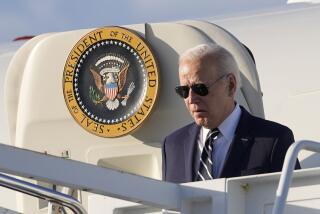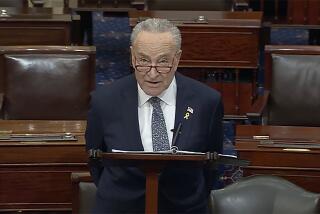U.S. response muted to Al Qaeda affiliate’s gains in Syria and Iraq
WASHINGTON – Americans were agreed after the Sept. 11, 2001, terrorist attacks that allowing extremist groups like Al Qaeda to hold territory posed a direct danger to the U.S. homeland.
Yet news this month that fighters from an Al Qaeda affiliate have seized territory from Syria’s border region to the edge of the central Iraqi cities of Ramadi and Fallouja has drawn only mild reactions from the public and members of Congress.
Many congressional Republicans prominent in foreign affairs have said little on the issue. And when House Speaker John A. Boehner raised the matter Thursday, he criticized the Obama administration but urged a policy that the White House has largely embraced.
The administration has “chosen to spend much of its time and energy trying to explain why having terrorists hold key terrain in the Middle East is not the president’s problem,” said the Ohio Republican.
Asked what the administration should do, he urged the White House to send “equipment and other services” but no U.S. troops.
Administration officials, alarmed by the advances by insurgents with the Islamic State of Iraq and Syria group, have said they intend to send more air-to-ground missiles, small surveillance drones, Apache helicopters and other equipment to help the Iraqi government fight the militants and regain ground.
The White House has ruled out sending any U.S. troops, who completed their withdrawal from Iraq in 2011.
“This is their fight,” said Secretary of State John F. Kerry said of the Iraqis.
Sen. John McCain (R-Ariz.), a frequent advocate of using U.S. military force, said the administration “blew the whole thing” by pulling out from Iraq in 2011, rather than leaving a residual force.
But McCain, too, in an appearance on the Fox network, stopped short of calling for direct U.S. troop involvement, urging more arms and diplomatic pressure.
Christopher Preble, a foreign policy analyst at the Cato Institute, a libertarian think tank, said Republicans have been muted because they know urging a U.S. return to Iraq is unpopular and would remind the public of a blunder – the 2003 invasion and subsequent eight-year war – for which it largely blames Republicans.
“They want to talk about their foreign policy successes, not their failures,” he said.
Lee Feinstein, a former U.S. ambassador and senior fellow at the German Marshall Fund of the United States, said public reaction had been mild because of war weariness, and because the administration has put forward a strategy to address the situation.
Senate Majority Leader Harry Reid (D-Nev.) taunted Boehner for his criticism of the administration on Iraq.
“I wonder if the speaker wants us to send more troops, or wants to send troops into Iraq now? They’re home. The American people are glad,” Reid said.
Rep. Ed Royce, (R-Fullerton), chairman of the House Foreign Affairs Committee, said, “Left alone, these militants pose a serious threat to U.S. strategic interests.” He called for the administration to provide “appropriate counter-terrorism support” to Iraq.
Carroll Doherty, director of political research at the nonpartisan Pew Research Center, said the threat of terrorism continues to be identified as the top danger to Americans in Pew surveys. But he said public interest in Iraq “has really faded from the scene.”
Several polls have shown that most Americans believe that the U.S. invasion of Iraq was not worth the price, he noted.
Twitter: @richtpau
More to Read
Start your day right
Sign up for Essential California for news, features and recommendations from the L.A. Times and beyond in your inbox six days a week.
You may occasionally receive promotional content from the Los Angeles Times.







